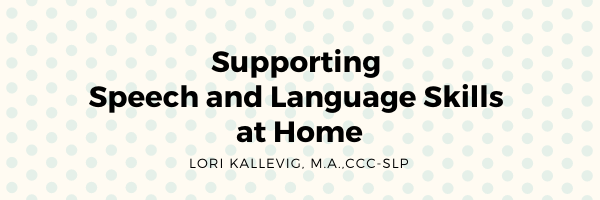Lori Kallevig, M.A., CCC-SLP is a Speech-Language Pathologist. She is the owner of Sprout Therapy, which offers speech and occupational therapy to pediatric and adult populations. Sprout Therapy also partners with Strongsville Recreation Department and Beyond Words to provide camps that address speech and language skills.
If nothing else, in (almost) the past 6 months you have had more time to spend with family than you ever did before. During this time, there’s been an influx of feelings, both positive and negative. You may have previously had concerns about your child’s speech or language skills, or it’s an area that you are just starting to explore now. One of the most common questions we receive is “What can I do?” or “Where do I start?”
Be Intentional
Something about the word “intentional” continues to be a reoccurring theme for me. Be Intentional. Be intentional with your life, how to spend your time, and the conversations you have with your child. Your conversations hold such purpose and are the gateway to the way that your child interacts with the world around them. Children learn through models…peer models and adult models. The language that a child hears in their environment is the language (and way of using language) that your child will aim to replicate.
Speech Therapy 101
Whether you notice something about the way your child speaks seems different but you aren’t sure what; or, your doctor (trusted professional) has recommended speech therapy, it may bring up many questions. For example, you may wonder, they can make all of their sounds-- What is speech therapy anyways? Individuals (children and adults) attend speech therapy for a variety of reasons. Speech Language Pathologists may have many names (speech therapist, speech teacher, SLP) and may have many specialties. Generally, they are licensed to provide speech (articulation) or language instruction. Speech (articulation/phonology) has to do with the way an individual produces a sound (I.E.: if someone uses a “d” for a “g” sound- they say “dough” vs. “go”). Language skills can include social skills, making longer sentences, vocabulary, grammar, fluency (stuttering), augmentative communication (AAC/speech devices), etc. Speech therapists may also specialize in feeding, myofascial differences, executive functioning (ADHD/organization), special populations, and so much more! First and foremost, if you have concerns about your child’s speech and language skills, start with a screening or evaluation with a speech language pathologist that you are comfortable with. This will give you a piece of mind, but also will provide some guidance and a general course of any necessary treatment. Still, you can enhance your child’s speech and language skills in a multitude of ways at home along with any therapy that may be recommended.
Take a Step Back
You have so much on your plate. Make sure before anything else, you foster the relationship with your child, and do not put pressure to have your child repeat your speech patterns all day long. We often encourage our families to start small and get talking. Pick just one activity in your day and make it a language focus. Focus more on using the correct language that you what your child to produce, and less of a point of having your child repeat you. I know this seems counterproductive, but it will provide models while encouraging conversation skills that will last a lifetime!
Practice Makes Perfect
When you hear your child make a mistake, the best thing you can do is to rephrase what they say in the correct way. If your child is saying a speech sound wrong (i.e.: your child says “let’s DOUGH” vs. “Let’s GO”) you can respond by using (and over producing) the “g” sound correct in “go” (i.e.: you respond with “oh, your shoes are on, it looks like you are ready to GO! I’m ready too, let’s GO!”). If there is a language error such as trouble with past tense verbs (i.e.: your child says “I eated it already”) you can respond by repeating what they say with the error corrected (i.e.: “You ate it already!? How did you do that! I cannot believe you ate it already!”). Anything you can do to engage your child, keep it light, and make it fun!
Smarter Not Harder
In our parent/child early language courses, we say this from day one. You have enough on your plate. You do not need to curate a perfectly planned day filled with Pinterest/Instagram filtered speech and language beauty from the second your child wakes up, to the moment their eyes (finally) close. With my own kids, the Grocery Store was my favorite place to take my son (pre-quarantine!) We would spend our time following our list, looking for items, describing tastes, smells, and colors of the items in our cart. Since things have changed due to COVID-19, we have found ourselves loving the park, and taking trips to the carwash. At the carwash we talk about textures of the brushes (which ones look smooth or scratchy), sounds (the vacuums are loud, but the sound of the water is quiet), attributes (the colors of the soap, cars, brushes, etc). It often helps to make an outline of your day and identify just one area that you will dedicate to speech/language enhancing activities.
How Can We Help?
If you have questions about your child’s speech/language skills, are interested in an evaluation, or treatment please feel free to reach out to us through our website, or by phone/email.
SPROUT THERAPY, LLC
sprouttherapyllc@gmail.com
www.sprouttherapyllc.com
440-316-2416
For additional information about typical speech/language milestones visit the following article from the American Speech Language Association at: https://www.asha.org/public/Early-Identification-of-Speech-Language-and-Hearing-Disorders/






